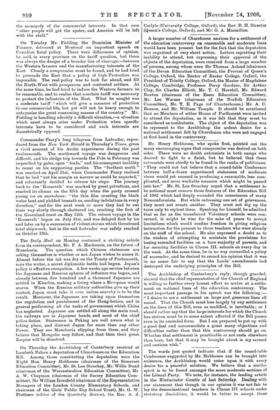Mr. Henry Hobbouse, who spoke first, pointed out the many
encouraging signs that compromise was desired on both sides. There were no doubt extremists in both camps who desired to fight to a finish, but he believed that these extremists were chiefly to be found in the ranks of politicians. "They could not but believe that a round-table Conference between half-a-dozen experienced statesmen of moderate views would yet succeed in producing a reasonable, less com- plicated, and more workable measure which might be passed into law." Mr. St. Loe Strachey urged that a settlement to be national must remove those features of the Education Bill of 1902 which had deeply wounded the consciences of many Nonconformists. But while redressing one set of grievances; they must not create another. They must not dig up the tares only to replant them. Speaking for himself, he admitted that so far as the transferred Voluntary schools were con- cerned, it might be wise for the sake of peace to accept limitations which would confine freedom in giving religious instruction for the present to those teachers who were already on the staff of the school. He also expressed a doubt as to the -wisdom of attempting to maintain the provisions for basing extended facilities on a bare majority of parents, and for securing facilities in Clause III. schools on every day in the week. At the same time, he in no way counselled a policy of surrender, and he desired to record his opinion that it was in no sense fair to say that the Lords' amendments had destroyed the underlying principles of the Bill.














































 Previous page
Previous page